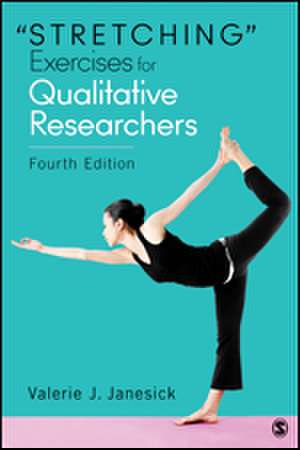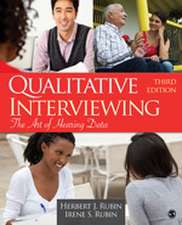"Stretching" Exercises for Qualitative Researchers
Autor Valerie J. Janesicken Limba Engleză Paperback – 26 oct 2015
?New to this edition:
- 10 new stretching exercises help qualitative researchers practice the techniques needed to sustain them in the post-modern digital era.
- An all-new chapter on The Technology Habit includes coverage of Skype, voice recognition software, virtual interviews, and more.
- New examples clarify narrative writing in its many forms.
- New examples of sample projects provide exemplars and models for students.
- Twenty new figures help explain analysis and interpretation.
Preț: 611.09 lei
Preț vechi: 718.92 lei
-15% Nou
Puncte Express: 917
Preț estimativ în valută:
116.93€ • 122.40$ • 97.32£
116.93€ • 122.40$ • 97.32£
Carte tipărită la comandă
Livrare economică 31 martie-14 aprilie
Preluare comenzi: 021 569.72.76
Specificații
ISBN-13: 9781483358277
ISBN-10: 1483358275
Pagini: 320
Dimensiuni: 152 x 229 x 20 mm
Greutate: 0.39 kg
Ediția:Fourth Edition
Editura: SAGE Publications
Colecția Sage Publications, Inc
Locul publicării:Thousand Oaks, United States
ISBN-10: 1483358275
Pagini: 320
Dimensiuni: 152 x 229 x 20 mm
Greutate: 0.39 kg
Ediția:Fourth Edition
Editura: SAGE Publications
Colecția Sage Publications, Inc
Locul publicării:Thousand Oaks, United States
Recenzii
"Stretching" Exercises for Qualitative Researchers is an important text, and a must have for qualitative researchers. For my students—and myself—the opportunities to deepen the creative self provide essential tools for broadening our horizons of understanding and approaches to our participants, our work, and ourselves.
Research methods is a rigorous and over-rational man sitting in a pond. People are afraid of him and hold him in awe. No one invites him to dance. But Valerie J. Janesick did, because he saw his emotion, his passion, and his possibility to be a dancer.
Research methods is a rigorous and over-rational man sitting in a pond. People are afraid of him and hold him in awe. No one invites him to dance. But Valerie J. Janesick did, because he saw his emotion, his passion, and his possibility to be a dancer.
Cuprins
Chapter 1. Qualitative Research and Habits of Mind
Identifying, Practicing, and Developing Habits
Getting Feedback and Writing About It
Finding Your Theoretical Habit
Developing Habits of Mind
Terms Used to Describe Qualitative Research
Characteristics of Qualitative Work
Questions Suited to Qualitative Research Methods
Using Theory in Qualitative Research
Artistic Approaches to Qualitative Research
Contemplative Qualitative Inquiry and the Zen of Research
Why Try These Exercises?
How to Use This Book
The Audience for This Book
Suggested Resources
Chapter 2. The Observation, Reflection, and Writing Habit
Exercise 2.1: Observing a Still Life Scene
Description of a Still Life Scene
Constructing a Researcher Reflective Portfolio
Types of Portfolios and Assessment
How the Electronic Portfolio Works
Portfolio Contents
Exercise 2.2: Physical Description of This Setting
Exercise 2.3: Observation in the Home or Workplace
Exercise 2.4: Description of a Familiar Person or a Stranger
The Qualities of Exemplary Case Studies
Exercise 2.5: Observing at an Art Museum or at a Movie
Exercise 2.6: Observing an Animal at Home, the Zoo, or a Pet Shop
Exercise 2.7: Drawing to Become a Better Observer: Drawing Upside Down
Chapter 3. Advancing the Observation, Reflection, and Writing Habit
Exercise 3.1: Nonparticipant Observation Assignment
Exercise 3.2: Reflecting to Strengthen the Writing Habit
Exercise 3.3: Writing Your Educational Autobiography
Exercise 3.4: Writing a Pedagogical Letter
Next Steps: Self-Evaluation
Pitfalls in Observation
Chapter Summary
Suggested Resources
Chapter 4. The Interview and Writing Habit
Two People Talking, Communicating, and Constructing Meaning
Types of Interview Questions
Preparing Questions
Examples of Interview Questions From a Recent Study
Exercise 4.1: Interviewing Someone You Know
Exercise 4.2: Interviewing a Stranger
Exercise 4.3: The Oral History Interview
Exercise 4.4: The Focus Group Interview Demonstration Exercise
Exercise 4.5: Presenting Interview Data as a Found Data Poem
Exercise 4.6: Describing Your Role in a Research Project as Identity Poetry
Exercise 4.7: The Digital, Virtual Interview and Google Groups
Exercise 4.8: Interviewing Someone Twice
Exercise 4.9: Practicing an Online Interview
Conducting Qualitative Interviews: Some Rules of Thumb
Chapter Summary
Suggested Resources
Chapter 5. The Creative Habit
The Role of the Researcher and the Researcher Reflective Journal
Exercise 5.1: Variations on Writing Your Name
Exercise 5.2: The Camera as an Extension of the Eye, the Eye as an Extension of the Soul
Exercise 5.3: Building a Collage: My Role as a Researcher
Exercise 5.4: Constructing a YaYa Box or Making a Quilt Patch
The Qualitative Researcher and the Intuitive Sense
Exercise 5.5: Writing About Your Favorite Vegetable
Serendipity
Intuition, Creativity, and Compassion in Research
The Researcher Reflective Journal as Creative Act
Exercise 5.6: Your Journey
Future Directions
Exercise 5.7: Reflective Journal Writing Practice in Dialogue Form
Exercise 5.8: Haiku and Any Form of Poetry on the Role of the Researcher
Exercise 5.9: Framed Photograph and Narrative Writing Exercise
Exercise 5.10: Writing Timeline Exercise
Chapter Summary
Suggested Resources
Chapter 6. The Analysis Habit
The Qualitative Researcher as Contemplative and Mindful
Checkpoints for Data Analysis, Reporting, and Interpretation
Various Approaches to Analysis and Interpretation of Data
Ethics and the Qualitative Researcher
True Stories: Sample Ethical Dilemmas
Attributes of the Qualitative Researcher
Qualitative Researchers Interacting With Institutional Review Boards, IRBs
Chapter Summary
Exercise 6.1: Design and Create a Cover for Your Researcher Reflective Journal
Exercise 6.2: Describe Your Favorite Meal
Exercise 6.3: Writing About Change in Yourself in Any Five-Year Period
Chapter 7. The Technology Habit
Benefits for Small-Scale Studies Using Technology
The Context
The Power of Skype Interviewing
Next Steps: Editing Through Audacity
Transcription With Express Scribe, Dragon, iTalk, iSpeak, and MS Word
Voice Recognition Software
Researcher Reflective Portfolios
Excel as a Text/Data Analysis Tool
Analysis Strategies From MS Word to MS Excel
Overall Virtual Interview: From Collection to Analysis
Electronic Mailing Lists, Websites, Journals, and Software Options
Exercise 7.1: Conducting and Transcribing a Skype Interview Using Express Scribe for Transcription
Exercise 7.2: Create a Word Cloud Using Wordle and One With Tagxedo
Exercise 7.3: Create a Glog, a Poster Online Through Glogster
Chapter Summary
Identifying, Practicing, and Developing Habits
Getting Feedback and Writing About It
Finding Your Theoretical Habit
Developing Habits of Mind
Terms Used to Describe Qualitative Research
Characteristics of Qualitative Work
Questions Suited to Qualitative Research Methods
Using Theory in Qualitative Research
Artistic Approaches to Qualitative Research
Contemplative Qualitative Inquiry and the Zen of Research
Why Try These Exercises?
How to Use This Book
The Audience for This Book
Suggested Resources
Chapter 2. The Observation, Reflection, and Writing Habit
Exercise 2.1: Observing a Still Life Scene
Description of a Still Life Scene
Constructing a Researcher Reflective Portfolio
Types of Portfolios and Assessment
How the Electronic Portfolio Works
Portfolio Contents
Exercise 2.2: Physical Description of This Setting
Exercise 2.3: Observation in the Home or Workplace
Exercise 2.4: Description of a Familiar Person or a Stranger
The Qualities of Exemplary Case Studies
Exercise 2.5: Observing at an Art Museum or at a Movie
Exercise 2.6: Observing an Animal at Home, the Zoo, or a Pet Shop
Exercise 2.7: Drawing to Become a Better Observer: Drawing Upside Down
Chapter 3. Advancing the Observation, Reflection, and Writing Habit
Exercise 3.1: Nonparticipant Observation Assignment
Exercise 3.2: Reflecting to Strengthen the Writing Habit
Exercise 3.3: Writing Your Educational Autobiography
Exercise 3.4: Writing a Pedagogical Letter
Next Steps: Self-Evaluation
Pitfalls in Observation
Chapter Summary
Suggested Resources
Chapter 4. The Interview and Writing Habit
Two People Talking, Communicating, and Constructing Meaning
Types of Interview Questions
Preparing Questions
Examples of Interview Questions From a Recent Study
Exercise 4.1: Interviewing Someone You Know
Exercise 4.2: Interviewing a Stranger
Exercise 4.3: The Oral History Interview
Exercise 4.4: The Focus Group Interview Demonstration Exercise
Exercise 4.5: Presenting Interview Data as a Found Data Poem
Exercise 4.6: Describing Your Role in a Research Project as Identity Poetry
Exercise 4.7: The Digital, Virtual Interview and Google Groups
Exercise 4.8: Interviewing Someone Twice
Exercise 4.9: Practicing an Online Interview
Conducting Qualitative Interviews: Some Rules of Thumb
Chapter Summary
Suggested Resources
Chapter 5. The Creative Habit
The Role of the Researcher and the Researcher Reflective Journal
Exercise 5.1: Variations on Writing Your Name
Exercise 5.2: The Camera as an Extension of the Eye, the Eye as an Extension of the Soul
Exercise 5.3: Building a Collage: My Role as a Researcher
Exercise 5.4: Constructing a YaYa Box or Making a Quilt Patch
The Qualitative Researcher and the Intuitive Sense
Exercise 5.5: Writing About Your Favorite Vegetable
Serendipity
Intuition, Creativity, and Compassion in Research
The Researcher Reflective Journal as Creative Act
Exercise 5.6: Your Journey
Future Directions
Exercise 5.7: Reflective Journal Writing Practice in Dialogue Form
Exercise 5.8: Haiku and Any Form of Poetry on the Role of the Researcher
Exercise 5.9: Framed Photograph and Narrative Writing Exercise
Exercise 5.10: Writing Timeline Exercise
Chapter Summary
Suggested Resources
Chapter 6. The Analysis Habit
The Qualitative Researcher as Contemplative and Mindful
Checkpoints for Data Analysis, Reporting, and Interpretation
Various Approaches to Analysis and Interpretation of Data
Ethics and the Qualitative Researcher
True Stories: Sample Ethical Dilemmas
Attributes of the Qualitative Researcher
Qualitative Researchers Interacting With Institutional Review Boards, IRBs
Chapter Summary
Exercise 6.1: Design and Create a Cover for Your Researcher Reflective Journal
Exercise 6.2: Describe Your Favorite Meal
Exercise 6.3: Writing About Change in Yourself in Any Five-Year Period
Chapter 7. The Technology Habit
Benefits for Small-Scale Studies Using Technology
The Context
The Power of Skype Interviewing
Next Steps: Editing Through Audacity
Transcription With Express Scribe, Dragon, iTalk, iSpeak, and MS Word
Voice Recognition Software
Researcher Reflective Portfolios
Excel as a Text/Data Analysis Tool
Analysis Strategies From MS Word to MS Excel
Overall Virtual Interview: From Collection to Analysis
Electronic Mailing Lists, Websites, Journals, and Software Options
Exercise 7.1: Conducting and Transcribing a Skype Interview Using Express Scribe for Transcription
Exercise 7.2: Create a Word Cloud Using Wordle and One With Tagxedo
Exercise 7.3: Create a Glog, a Poster Online Through Glogster
Chapter Summary
Notă biografică
Descriere
Uses dance, yoga, and meditation metaphors to help researchers tap into the intuitive and creative side of their research.





